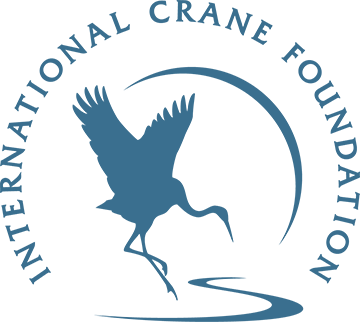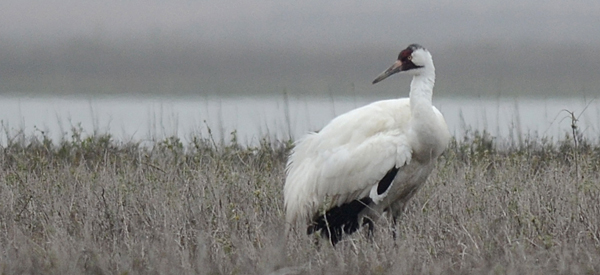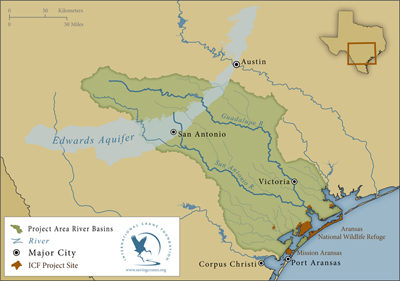| Media contact: Liz Smith, ICF Texas Program Manager and Whooping Crane Conservation Biologist
| |
| Want to Learn More? Click here to read The Aransas Project’s initial analysis of the ruling, and read Dr. Liz Smith’s letter in response to the Firth Circuit Court of Appeal’s decision (Victoria Advocate, July 27, 2014). The International Crane Foundation (ICF) is disappointed that earlier this week the Fifth Circuit Court of Appeals reversed a lower court decision that mandated fresh-water inflows to Whooping Crane habitat on the Texas coast. The three judge panel held that legal aspects of the Endangered Species Act (ESA) were misapplied in the lower court decision, when it found that the Texas Commission on Environmental Quality (TCEQ) was liable for the deaths of 23 Whooping Cranes in 2008-2009 (read our update on the 2013 decision). This case was brought in March 2010 by The Aransas Project (TAP), a non-profit coalition of municipalities, businesses, and conservation organizations including ICF. TAP contended that the TCEQ allowed too much water to be removed from the Guadalupe and San Antonio Rivers, and consequently the bay salinity increased beyond what drought would cause. These actions resulted in reduced fresh drinking water and food supply for the cranes and ultimately caused the 23 deaths, which was 8.5% of the Texas Whooping Crane flock. In the original ruling, U.S. District Court Judge Janis Jack stated that TCEQ violated the ESA through their water management practices, including not exercising available emergency powers to protect the cranes. The District Court ordered TCEQ to stop granting new water use permits for the rivers until they could provide reasonable assurances that new permits would not result in harm to the Whooping Crane. TCEQ was directed to seek an Incidental Take Permit from the U.S. Fish and Wildlife Service, which requires development of a Habitat Conservation Plan, outlining conservation measures designed to minimize and mitigate harm to the endangered species. The Court of Appeals found that TAP presented compelling evidence of up to 23 Whooping Crane deaths in 2008-2009, and that the deaths were related to lack of essential food, water and habitat requirements. However, the Court ruled that the deaths could not have been foreseen, and that TCEQ cannot be held liable because their authorization of water use was too attenuated from the crane deaths. TAP will continue to evaluate this decision and may seek further court review. ICF is sincerely grateful for the commitment and expertise demonstrated by TAP coalition members and the legal team led by Jim Blackburn. Deep appreciation is forwarded to the financial underwriters of this legal battle in the interest of restoring health to a vibrant, diverse coastal ecosystem and ensuring favorable conditions for the endangered Whooping Cranes and coastal communities. Next Steps: On July 29, 2014, The Aransas Project responded to the recent Fifth Circuit Court of Appeal’s three judge panel decision by asking that there be review of the panel’s decision with all of the Fifth Circuit judges participating (view the full petition). Although this kind of request is rarely sought or granted, it is a particularly appropriate request in this case. The Appeals panel seemingly exceeded its authority by disregarding the fact finding done by the trial judge, and substituted its own fact finding, rather than returning the case to the district court with direction to apply the facts to what the panel believes is the correct legal standard. This seeming judicial activism in the recent Appeals decision may be enough for the rest of the Fifth Circuit Court judges to reconsider the case with all judges participating. |  ICF acknowledges that this is a serious setback to environmentally sound water management to ensure a healthy coastal ecosystem for the future of Whooping Cranes and coastal communities. However, this only reinvigorates our efforts. As ICF’s Texas Program Manager, Liz Smith, reflects: “We must find viable solutions that apportion the limited available water throughout the coastal basins without sacrificing quality of life for its residents, or reducing the estuary ecosystems to lifeless bodies of water. In the Guadalupe-San Antonio Basin, the other unacceptable choice would be taking on the responsibility for the extinction of North America’s iconic species, the Whooping Crane.” Make a gift to support Whooping Crane conservation. |

 Whooping Crane near Rockport, Texas. Photo by Mike Endres, Little Wing Photo
Whooping Crane near Rockport, Texas. Photo by Mike Endres, Little Wing Photo